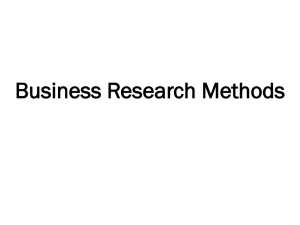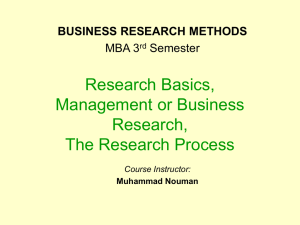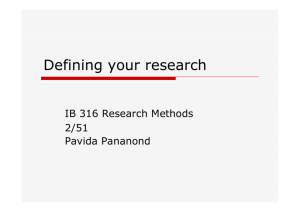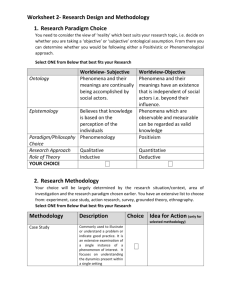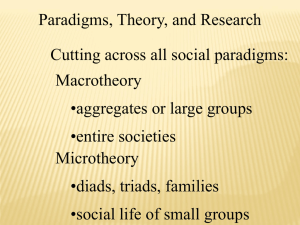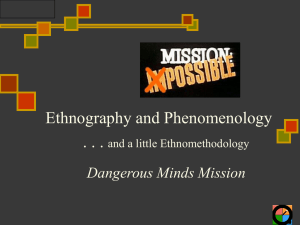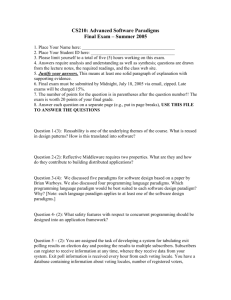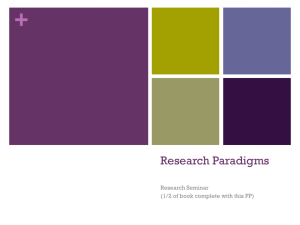RESEARCH PARADIGMS AND METHODOLOGIES
advertisement
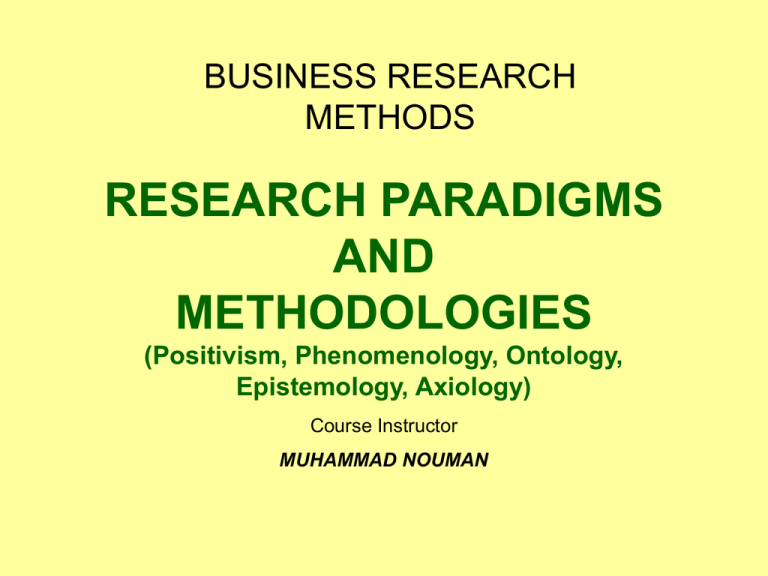
BUSINESS RESEARCH METHODS RESEARCH PARADIGMS AND METHODOLOGIES (Positivism, Phenomenology, Ontology, Epistemology, Axiology) Course Instructor MUHAMMAD NOUMAN What is the single most important difference? • • • • • • • Anger Speed Authority Time Entertainment Sleep Profit Paradigm • “Refers to the progress of scientific practice based on people’s philosophies and assumptions about the world and the nature of knowledge” • Paradigms offer a framework comprising an accepted set of theories, methods, and ways of defining data Methodology • “The theory of how research should be undertaken, including the theoretical and philosophical assumptions upon which research is based and the implications of these for the method or methods adopted.” The Philosophical Position…. Ontology: what is the nature of reality? Epistemology: What is valid knowledge? Axiology: Role of values RESEARCH STRATEGY Positivism Phenomenology Reality is objective and singular, apart from the researcher Reality is subjective and multiple as seen by the participants Researcher is independent from that being researched Researcher interacts with that being researched Value free and un-biased Value-laden and biased • Cross-sectional studies • Action Research • Experimental studies • Longitudinal studies • Surveys • Etc... • Case Studies • Ethnography • Grounded Theory • Hermeneutics, etc... Features of research paradigms Positivistic paradigm Phenomenological paradigm Tends to produce quantitative data Tends to produce qualitative data Uses large samples Uses small samples Concerned with hypothesis testing Concerned with generating theories Data is highly specific and precise Data is rich and subjective The location is artificial The location is natural Reliability is high Reliability is low Validity is low Validity is high Generalises from sample to population Generalises from one setting to another The ‘scientific’ method • A generally accepted set of procedures for developing and testing theories • An idealised model to arrive at “the truth” through: – – – – Objective observation Measurement Careful and accurate analysis of data Minimising pre-conceptions about how the world works • What paradigm are we in here? Maylor and Blackmon (2005) The Positivistic approach Define your research topic Literature review Define your research question(s) i.e. hypothesis Deductive Design data collection Pilot study Design data analysis Collect data Analyse data Interpret results Report your findings Adapted from Maylor and Blackmon (2005) The Phenomenological approach • A generally accepted set of procedures for collecting information about the world • An idealised model to arrive at “the data” through: – Subjective observation – Being led by the data (ie. induction) – Trying to overcome biases about the situation – Avoiding conceptual frameworks or instruments that might influence what is observed Maylor and Blackmon (2005) The Phenomenological approach Define your research topic Literature review Define your research question(s) Design data collection Inductive Collect data Analyse data Literature review Interpret data Research question answered? Report your findings Adapted from Maylor and Blackmon (2005) Comparing approaches Characteristic Positivism What? Questions that can be answered How much? Phenomenology Why? How? Direct observation, Interviews, Participant observation Associated methods Survey, Experiment Data type Predominantly numbers Predominantly words Finding Measure Meaning Adapted from Maylor and Blackmon (2005) Why does the approach matter? Whether you take a scientific (positivistic) or phenomenological approach will influence: • What research questions you ask • What methods you use to collect your data • What type of data you collect • What techniques you use to analyse your data Maylor and Blackmon (2005) The research ‘onion’ Source: © Mark Saunders, Philip Lewis and Adrian Thornhill 2006


